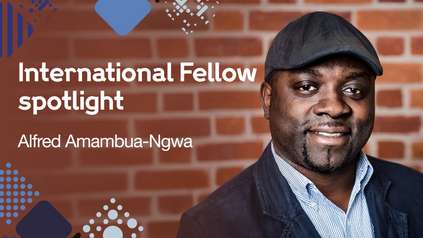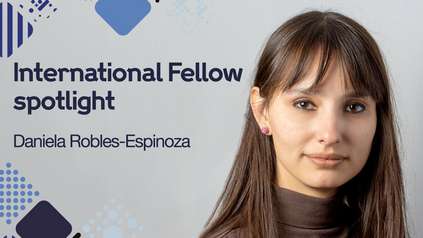Welcoming our 2025 International Fellows
Listen to “Welcoming our 2025 International Fellows” on Spreaker.
Six established researchers in Institutes from Low and Middle Income Countries will be joining us for three years to advance their own science in the Sanger Institute environment and help us design and deliver our scientific strategy. They are:
Dr Alejandro Reyes Muñoz, who is an Associate Professor at the Universidad de los Andes in Colombia, where he has led a research group in Computational Biology and Microbial Ecology for over a decade.
He will be collaborating with Dr Trevor Lawley in the Sanger Institute’s Parasites and Microbes programme, to look at how microbes vary in the gut under different cultural and health circumstances to provide a robust picture of the Colombian human gut microbiome. Alejandro’s work will serve as a baseline for future research projects and potentially inform public health decisions.
“Receiving support from the Sanger Institute—beyond just resources, but especially through its exceptional mentorship—creates a unique opportunity for researchers like us to drive innovation in microbial genomics. This support enables us to push the boundaries of our research, extending its impact from local and regional levels to a truly global scale.”
Dr Alejandro Reyes Muñoz, Associate Professor at the Universidad de los Andes in Colombia
Dr Caroline Cleopatra Chisenga is the Head of Department for the Enteric Disease and Vaccine Research Group at the Centre for Infectious Disease Research in Zambia. Her team assesses vaccine efficacy, safety and the human’s immune response to them including clinical trials in human infection challenge models.
She will be working with Professor Nick Thomson within the Parasites and Microbes programme. Her work will aim to examine the genetic markers of antibiotic resistance in the cholera-causing bacterium, V. cholerae in Zambia, Malawi and Zimbabwe. She hopes to understand the relationship between strains from different outbreaks and locations, and determine the impact of the introduction of a vaccine to Zambia in 2016.
“Finding a solution for a disease like cholera can only happen if we combine strategies to assess the efficacy of intervention with a greater understanding of the epidemiology and routes of infection using the genomics lens. Joining the broader International Fellow and Faculty network linked to Sanger will support the achievement of this goal. It will also allow me to combine my skills in vaccine implementation and induced immunity with the latest ‘omics’ approaches to try and address the issues around cholera.”
Dr Caroline Cleopatra Chisenga, Head of Department for the Enteric Disease and Vaccine Research Group at the Centre for Infectious Disease Research in Zambia
Dr Melisa Olave is an Associate Researcher at IADIZA-CONICET (Instituto Argentino de Investigaciones de las Zonas Áridas) and Professor at the National University of Cuyo in Argentina. Melisa is an evolutionary biologist specialising in the intersection of micro- and macroevolution, with a focus on biodiversity conservation.
She will be collaborating with Dr Joana Meier in the Sanger Institute’s Tree of Life Programme to further increase our understanding of the nature and process of speciation during rapid radiation events. She will be studying the Liolaemus lizard genus – iguanian lizards endemic to South America and one of the most diverse vertebrate animals known in the world.
“Joining the Sanger Institute as an International Fellow is a unique chance to bring world-class genomic expertise into my research on adaptation and evolution. This fellowship will help bridge fundamental science with conservation efforts, providing critical insights into biodiversity resilience.”
Dr Melisa Olave, Associate Researcher at IADIZA-CONICET and Professor at the National University of Cuyo in Argentina
Dr Miguel Antonio García Knight is a principal investigator at the Institute for Biomedical Research at the Universidad Nacional Autonoma de Mexico (UNAM). His lab studies host-pathogen interactions of emergent and re-emergent RNA viruses relevant to Latin America and East Africa.
He will be working with Dr Mara Lawniczak in the Tree of Life Programme to study how viruses become integrated into the host genome as an endogenous element, and how this process impacts antiviral immunity in disease vectors such as mosquitoes.
“This is a one-of-a-kind programme that has opened up avenues to generate equitable partnerships between our home institutions and Sanger to leverage genomic science at scale. It’s been amazing to meet all the other International Fellows and build bridges across our countries and regions – I’m thrilled to be part of this expanding academic community.”
Dr Miguel Antonio García Knight,Principal Investigator at the Institute for Biomedical Research at the Universidad Nacional Autonoma de Mexico
Dr Patricia Abrao Possik currently leads a research group at the Brazilian National Cancer Institute (INCA) in Rio de Janeiro focused on the cellular and molecular biology of tumours. The main focus of her group is on Acral Lentiginous Melanoma (ALM), an understudied subtype of skin cancer that is a significant health problem in Brazil and other Latin American countries.
The establishment of a strong collaboration with scientists, medical pathologists and clinicians at the Brazilian National Cancer Institute and abroad has enabled the collection of samples from Brazilian patients, which are being characterised genetically and used to generate experimental models aimed at understanding the biology of the disease and identifying therapeutic targets.
At the Sanger Institute, she will be collaborating with Dr David Adams in the Cancer, Ageing and Somatic Mutations Programme to deepen the understanding of this cancer, for which there are no specialist treatments.
“Being a Sanger International Fellow places us at the heart of cutting-edge science, where major discoveries happen. This experience not only inspires us but also creates opportunities, essentially opening an avenue of possibilities before us.”
Dr Patricia Abrao Possik, Group Leader at the Brazilian National Cancer Institute
Dr Patrick Musicha is a Bioinformatician and epidemiologist at the Malawi Liverpool Wellcome Programme, Malawi where he is an Associate Group Head and leads a growing team of researchers with diverse backgrounds, as well as supervising PhD and MSc students and interns.
As an International Fellow at the Sanger Institute, he will be working with Professor Nick Thomson to understand the pathways through which hospitalised patients and their close contacts acquire antimicrobial resistant strains of Enterobacteriaceae, a large family of bacteria including Salmonella, which can cause a range of diseases in Malawi, from urinary tract infections to diarrhoea.
“I am excited to join the Sanger International Fellows and continue to collaborate with world-class scientists at the Institute. This is a pivotal time for genomic research in Africa and the world, and our collaborations with the Sanger Institute provide a vital platform for us to make meaningful contributions.”
Dr Patrick Musicha, Associate Group Head at the Malawi Liverpool Wellcome Programme, Malawi
“Our International Fellows bring in a depth and wealth of experience that enables us, at the Sanger Institute, to widen the scope of our science, working with underrepresented communities and empowering regional leaders. We are elated to have Melisa, Patrick, Miguel, Patricia, Alejandro and Caroline join us this year, working across three of our scientific programmes at Sanger.”
Dr Trevor Lawley, Chair of the International Fellows Programme and Senior Group Leader at the Wellcome Sanger Institute
More information
Read more about our International Fellows programme
See all our International Fellows – current and alumni





